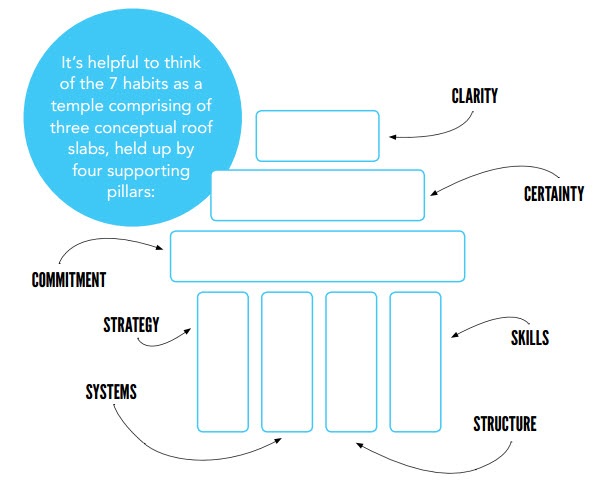The 7 habits of highly successful family businesses
Long-term, sustainable success is defined as achieving a happy family and a strong business. This holy grail of family business delivers peace and lasting prosperity. The families that genuinely achieve both have truly been blessed with the fruits of their labours – they didn’t get there through luck or neglect. The truth is that all successful families address and implement the 7 habits of highly successful business families, in some way or another.

Source: Family Business Magazine
What does it mean to have, and not have, each habit?
1. Clarity
Have: Clarity requires the family to identify and articulate its values, vision, mission and goals. This eliminates the agony of doubt about what’s intended for now, and the future, and explains everyone’s role in “The Plan”.
Have not: Absence of clarity is a major cause of family dysfunction and conflict. When people don’t even know if there is “A Plan”, or what’s expected of them, they become insecure, passive aggressive, disengaged, and ultimately destructive.
2. Certainty
Have: Certainty is created when the family collectively captures its clarity (values, vision, mission and goals) in writing.
Have not: Lack of certainty flows from absence of clarity. Either there is no plan, or it lies hidden in someone’s head. It’s common for leaders to believe that: (a) they have a plan; (b) everyone knows what it is; (c) and everyone accepts it. Big, big, mistake… huge mistake!
3. Commitment
Have: Commitment is obtained when everyone agrees to adopt the family’s values, vision, mission and goals, and makes them their own. The family now has shared and declared inclusive objectives – the essential foundation for any strong team – and is motivated to achieve them.
Have not: No clarity no certainty = no commitment. ‘Cos you’ve got nothing to commit to! Without shared objectives a family just has blood and emotional ties – enough to function as a family, but not enough to hold things together as a business in the long term.
4. Strategy
Have: Strategy is a formal, written plan. In family business land it’s actually two plans: a business strategy plan and a family plan. All plans should include: key directions; targets and goals; timelines and major milestones; allocated roles, responsibilities and accountabilities; review, measurement, modification and validation processes. Succession plans form part of these plans.
Have not: A strategy that isn’t written and adopted by all relevant family and business stakeholders is worthless. Plans that aren’t regularly reviewed for progress and acted upon are just as worthless. Confusion, dysfunction and disengagement are likely results.
5. Systems
Have: Systems are the policies, procedures and processes every organisation needs to be efficient and effective over the long term. Formal family policies are first line defences against unfounded assumptions, arbitrary decision making and emotion-based actions. The reliable performance engendered by good systems is fundamental to building and maintaining high trust relationships and high performance teams.
Have not: Lack of systems forces individuals, groups and organisations to invent a new approach every time they need to do anything. In addition to being inefficient, this encourages arbitrariness, neglect, false assumptions and misplaced reliance.
6. Structure
Have: Structures are tangible things that need to be put in place, and done, to action the plans. They provide discipline, clarity, stability, predictability and appropriate forums for dealing with issues and people. Foremost, they separate family issues from business decision making.
A family council (supported by a family office) is established to make and implement major decisions. Drafting a family constitution, and supplemental agreements, focuses the family’s attention, encourages discussion, and develops rules of engagement for: family conduct, employment, remuneration, entitlements, custodianship (including succession, transition and retirement), and many other things. Mutual obligations direct family members towards: personal tax, wills and estate planning; family trust and legal ownership structures; insurances; financial plans and asset protection (including financial agreements).
The business needs comparable structures: board of directors and/or advisory board, executive team, formal job descriptions (including roles and responsibilities), appropriate legal structures, shareholder agreements and succession plans.
Have not: Missing, inadequate and/or inappropriate structures expose the family and the business to confusion, complexity, liability, rigidity, and unnecessary expense. Lack of structure puts all or most of the responsibility for making wise decisions on Dad, Mum or a small group of family members, trusted employees and advisers. This can create intolerable pressures and tensions that can paralyse businesses and cause family meltdowns.
7. Skills
Have: Skills, in this context, are the big sleepers. It’s easy, and common, to believe that ostensibly competent adults “get it” and “have it”, meaning they can and will do what’s expected of them. In reality, for a variety of reasons from emotional immaturity and low resilience to intellectual and physical competence, individuals often fail to do what is expected of them. This is where training, coaching and mentoring have a vital role to play helping individuals achieve their true potential.
Have not: Successful business leaders develop their practical skills over many years, mainly from on-the-job learning. We don’t hear much about the unsuccessful ones because they don’t survive and therefore fall outside this conversation.
These leaders often fail to recognise what they’ve had to learn over the years and take it for granted. This disappoints when their children, with more academic learning and 30 years less experience, don’t demonstrate the business ‘smarts’ the parents assume they have.
Parents need to transfer their knowledge, skills and experience to their successors along so the next generation stand on their shoulders, not in their shoes.
Jon Kenfield is an FBA Accredited Adviser with The Solutionist Group and author of The Solutionist Guide to Family Business.
This article was first published in Family Business Magazine, November 2013.
















